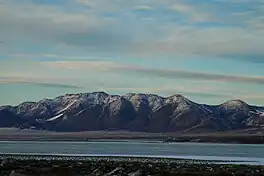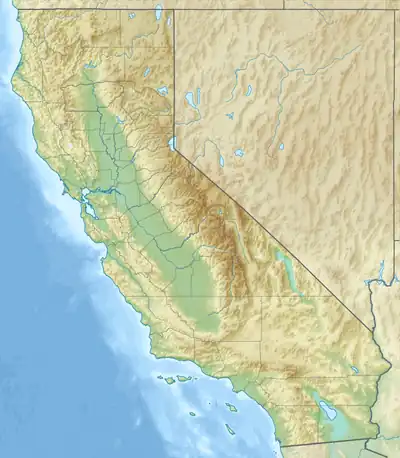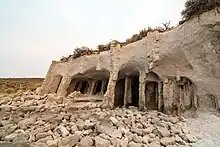Crowley Lake
Crowley Lake is a reservoir on the upper Owens River in southern Mono County, California, in the United States. Crowley Lake is 15 mi (24 km) south of Mammoth Lakes.
| Crowley Lake | |
|---|---|
 | |
 Crowley Lake  Crowley Lake | |
| Location | Mono County, California |
| Coordinates | 37°37′2.46″N 118°44′22.92″W |
| Lake type | reservoir |
| Primary inflows | Owens River |
| Primary outflows | Owens River |
| Basin countries | United States |
| Built | 1941 |
| Max. length | 12 mi (19 km) |
| Max. width | 5 mi (8.0 km) at widest point |
| Surface area | 5,300 acres (21 km2)[1] |
| Average depth | 40 ft (12 m) |
| Max. depth | 100 ft (30 m) |
| Shore length1 | 45 mi (72 km) |
| Surface elevation | 6,781 ft (2,067 m) |
| Website | Official website |
| 1 Shore length is not a well-defined measure. | |
The lake was created in 1941 by the building of the Long Valley Dam by the Los Angeles Department of Water and Power (DWP), as storage for the Los Angeles Aqueduct and for flood control. The dam is 126 ft (38 m) high and impounds 183,465 acre⋅ft (0.226301 km3). For more on the history of the lake, see Owens Lake.
It is known for its trout fishing. Between 6,000 and 10,000 anglers hit the lake on opening day. Crowley Lake Fish Camp, run in cooperation with the Los Angeles Department of Water and Power, is the only way to access the lake, and visitors can rent boats, book camping sites, and buy supplies at the Fish Camp.
The lake is named after Fr. John J. Crowley, "the desert Padre", who was a key figure in Owens Valley history and a local hero. When it became obvious that the city of Los Angeles's appropriation of the water supply had made agriculture impossible in the Owens Valley, many of the residents of the Valley lost all hope. Father Crowley traveled the Valley, convincing many of them that it could become a tourist destination. Father Crowley was killed in 1940 in an automobile accident.
Columns
Upon completion of the reservoir in 1941, strange columnar formations, some of which reached heights of 20 ft (6.1 m), were spotted along the reservoir's eastern shore. Some described them as stone cylinders connected by fortified stone arches that had been completely covered and obscured for millions of years but which had been gradually unmasked by the incessant pummeling of the lake's powerful waves, whose constant pounding had eroded the more malleable rock at the base of the cliffs encasing these pillars.[2]

Formation
The pillars were simply regarded as oddities until 2015 when geologists from UC Berkeley realized that they were the result of frigid water from melting snow seeping down into volcanic ash (the result of a catastrophic eruption more than 760,000 years prior), creating tiny holes in the hot ash, the byproduct being boiling water and steam, which then rose up, creating convection cells, which later filled with minerals more resistant to erosion than the surrounding volcanic ash.[2] Samples of the resulting "evenly spaced convection cells similar to heat pipes" were analyzed using X-rays and electron microscopes, with the UC Berkeley researchers finding that minute crevices in these "convection pipes" were bonded in place by minerals that were able to resist the erosion of the lake's waves.[2] Researchers have counted nearly 5,000 of these pillars, which appear in groups and vary widely in shape, size, and color over an area of 4,000 acres (1,600 ha), with some of the columns standing as erect as towering pylons and sporting ringed apertures approximately a foot apart.[3] Others are warped or leaning at various angles, and others are half-submerged and, some say, resemble the petrified remains of dinosaur vertebrae.[3]
References
- "Staff Report : Recommendation to de-List Crowley Lake for Nitrogen and Phosphorus" (PDF). Waterboards.ca.gov. Retrieved 2013-11-02.
- "Mystery Of Crowley Lake Columns Solved". Geology In. January 12, 2017. Archived from the original on June 12, 2018. Retrieved March 19, 2022.
The columns began forming as snowmelt seeped into the still hot tuff. The water boiled, creating "evenly spaced convection cells similar to heat pipes", according to the study to be presented next month in San Francisco at an American Geophysical Union meeting
- Sahagun, L. (2015-11-15). "Researchers determine origin of mysterious stone columns along Crowley Lake". Los Angeles Times. Retrieved 2015-11-26.
External links
 Media related to Crowley Lake at Wikimedia Commons
Media related to Crowley Lake at Wikimedia Commons- Map of DWP assets in Long Valley (Largest lake is Crowley)
- Lake Crowley Fishing Map
